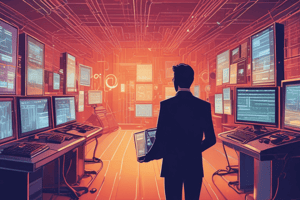Podcast
Questions and Answers
What category of human need includes the need for food and water?
What category of human need includes the need for food and water?
- Visceral need (correct)
- Affective need
- Cognitive need
- Formalized need
Which type of need is described as a conscious, within-brain description?
Which type of need is described as a conscious, within-brain description?
- Visceral need
- Formalized need
- Conscious need (correct)
- Compromised need
What may trigger affective or cognitive needs according to the outlined theories?
What may trigger affective or cognitive needs according to the outlined theories?
- Physiological needs (correct)
- Formalized needs
- Cognitive processes
- Compromised needs
What is the main characteristic of an affective need?
What is the main characteristic of an affective need?
Which type of need is characterized by a formal statement of the need?
Which type of need is characterized by a formal statement of the need?
According to Wilson's Model, what can arise from the failure to satisfy cognitive needs?
According to Wilson's Model, what can arise from the failure to satisfy cognitive needs?
What does Wilson's Model of Information Behavior primarily explain?
What does Wilson's Model of Information Behavior primarily explain?
How are cognitive needs described in relation to information?
How are cognitive needs described in relation to information?
What does data represent in the DIKW model?
What does data represent in the DIKW model?
Which philosophical standpoint underlies the intellectual backdrop of the IKW hierarchy?
Which philosophical standpoint underlies the intellectual backdrop of the IKW hierarchy?
What is the primary critique of the DIKW model according to Fricke (2007)?
What is the primary critique of the DIKW model according to Fricke (2007)?
What transition occurs when data is promoted to information?
What transition occurs when data is promoted to information?
What criticism is levied against the DIKW theory regarding the collection of data?
What criticism is levied against the DIKW theory regarding the collection of data?
How does knowledge differ from information in the DIKW model?
How does knowledge differ from information in the DIKW model?
What is the main focus of cybernetics according to Wiener?
What is the main focus of cybernetics according to Wiener?
What does refined operationalism suggest about certain concepts?
What does refined operationalism suggest about certain concepts?
How do theorists in the cybernetic tradition approach system issues?
How do theorists in the cybernetic tradition approach system issues?
What does General Systems Theory primarily address regarding living systems?
What does General Systems Theory primarily address regarding living systems?
What example illustrates the transition from data to information?
What example illustrates the transition from data to information?
Which of the following is NOT one of the critical functions performed by living systems according to General Systems Theory?
Which of the following is NOT one of the critical functions performed by living systems according to General Systems Theory?
What does the term 'entropy' refer to in the context provided?
What does the term 'entropy' refer to in the context provided?
According to Ongkiko & Flor, what is a significant aspect of entropy?
According to Ongkiko & Flor, what is a significant aspect of entropy?
What might the 'bugs' referred to in cybernetics also represent?
What might the 'bugs' referred to in cybernetics also represent?
Which exchange is NOT listed as a critical function of living systems?
Which exchange is NOT listed as a critical function of living systems?
What is the primary focus of development communication as outlined?
What is the primary focus of development communication as outlined?
What does Ongkiko & Flor suggest about systems in relation to organization?
What does Ongkiko & Flor suggest about systems in relation to organization?
What defines information science according to Taylor?
What defines information science according to Taylor?
Which of the following is NOT mentioned as a process in information management?
Which of the following is NOT mentioned as a process in information management?
What is one goal of creating avenues for public engagement in social issues?
What is one goal of creating avenues for public engagement in social issues?
What aspect of information is emphasized for optimizing accessibility according to Taylor?
What aspect of information is emphasized for optimizing accessibility according to Taylor?
Why is understanding the dynamics of information transformation essential?
Why is understanding the dynamics of information transformation essential?
Which phrase best describes information processing in the context of knowledge acquisition?
Which phrase best describes information processing in the context of knowledge acquisition?
What is one of the primary applications of information science according to Norton?
What is one of the primary applications of information science according to Norton?
What is essential for effective communication as stated in the content?
What is essential for effective communication as stated in the content?
What does George A. Miller suggest about human information processing capabilities?
What does George A. Miller suggest about human information processing capabilities?
How does the concept of weak knowledge differ from strong knowledge?
How does the concept of weak knowledge differ from strong knowledge?
In the context of the DIKW model, what is wisdom characterized as?
In the context of the DIKW model, what is wisdom characterized as?
What is the main idea behind categorizing and coding information?
What is the main idea behind categorizing and coding information?
What does the term 'channel capacity' refer to in the context of information processing?
What does the term 'channel capacity' refer to in the context of information processing?
Why is knowledge often considered inarticulable and finite?
Why is knowledge often considered inarticulable and finite?
What is the relationship between knowledge and information as suggested in the content?
What is the relationship between knowledge and information as suggested in the content?
What aspect of human capabilities does the content highlight as finite?
What aspect of human capabilities does the content highlight as finite?
Study Notes
Cybernetics
- Cybernetics is the science of "control and communication in the animal and the machine" (Wiener, 1962).
- Cybernetics is linked to General Systems Theory (Bertalanffy, 1968), which states that living systems exchange materials, energy, and information with their environment.
- Systems tend towards entropy, which Ongkiko & Flor (2006) define as a tendency towards greater uniformity and lesser differentiation or organization.
- To combat entropy, information needs to be processed for understanding and action.
Information Management in Development Communication
- Information science investigates the properties and behavior of information, its flow, and optimal accessibility.
- Information management encompasses origination, dissemination, collection, organization, storage, retrieval, interpretation, and use of information.
- Information science applications include managing, organizing, and retrieving information for various purposes.
The DIKW Hierarchy
- The DIKW (Data, Information, Knowledge, Wisdom) hierarchy classifies information into four levels of increasing complexity.
- Data is a fact or statement without relation to other things.
- Information embodies understanding of a relationship, often cause and effect.
- Knowledge presents a pattern connecting information, predicting future outcomes.
- Wisdom is the application of knowledge to achieve appropriate ends.
- The DIKW model has been criticized for its philosophical basis, encouraging mindless data collection and overlooking the role of "weak knowledge" or "knowledge-that," which is articulatable and recordable.
Human Information Behavior
- Human information needs are categorized as physiological, affective, and cognitive.
- Physiological needs trigger affective and/or cognitive needs.
- Affective needs can give rise to cognitive needs.
- Unsatisfied cognitive needs can result in affective needs.
- Information seeking behavior involves satisfying these needs through different levels of information need.
- Wilson's Model of Information Behavior explains information seeking across user categories.
Studying That Suits You
Use AI to generate personalized quizzes and flashcards to suit your learning preferences.
Related Documents
Description
Explore the interconnected principles of cybernetics and information management in this quiz. Understand the flow of information, control, and the challenges of entropy in systems. This quiz will assess your knowledge of key concepts and their applications.




